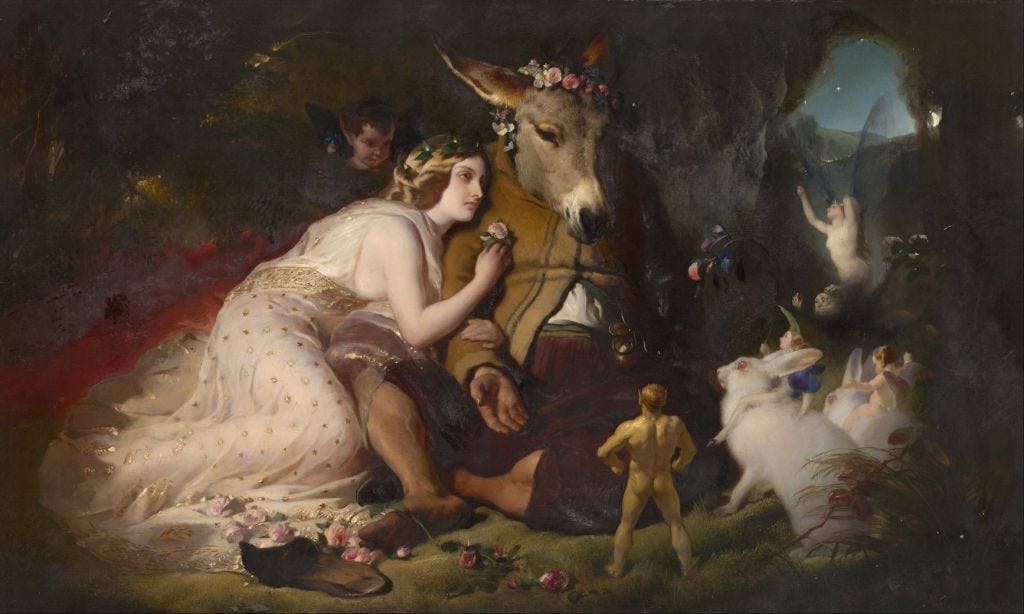Another gorgeous and genius comedy that addresses the theme of religious liberty. In fact, in the first scene Shakespeare highlights what’s at stake for Catholics in England.
Athenian law states the father tells his daughter who to marry. English law states the Queen tells Catholics who they marry. English law states Catholics must become Anglican. Yes, the Queen demands all Catholics forsake the faith of their fathers and apostatize and become part of the State church. According to English royalty, that was the duty of every Englishman, to take the Oath of Supremacy and forsake vows to the King of the Jews and Lord of the Universe. But beware, to take the Oath of Supremacy is to break our word to Christ, our eternal king and beautiful bridegroom.
But though this play starts with a severe set-up scene, have no fear, this is a comedy by Shakespeare. So, hilarity strikes through various storylines. One interesting point, almost self-deprecating and autobiographical, is the Fairy Queen falls in love with an actor dressed as a jackass. A key point of historical context, Queen Elizabeth was previously called the Fairy Queen by England’s other famous poets. Shakespeare is definitely poking fun at the powerful and treading dangerous lines with his storylines.
But the main storyline is the one that kicks off the story, a bridegroom (Lysander) and bride (Hermia) denied their right to marry by Athenian law, symbolic of Catholics denied their right to worship according to English law. The couple run off and escape to the forest like so many Catholics who had to escape to the continent. With too many important plot twists to note for a brief summary, let us end with this.
A key twist is when a mischievous fairy, Robin Goodfellow, mistakes his king’s commands and mistakenly puts “love juice” in the eyes of the wrong man. He puts the love potion on Lysander who wakes to see Helena, not his beloved Hermia. Because the love juice provokes love towards the first lady he sees, his true love was turned into a false love. And he begins pursing Helena, who rightly notes something is wrong, and warns Lysander,
“You do advance your cunning more and more.
When truth kills truth, O devilish holy fray!
These vows are Hermia’s. Will you give her o’er?
Weigh oath with oath, and you will nothing weigh.
Your vows to her and me, put in two scales,
Will even weigh and both as light as tales.”
Weigh oath with oath, Lysander’s true love turned false is symbolic of the Catholics who broke their oath to Christ in order to take the Oath of Supremacy imposed by English royalty. True love for the true Church was turned into a false love towards the State church. Thankfully, this is a comedy and all’s well that ends well. You’ll have to see the play to see how all is unraveled and true love restored, a story representative of the hope of Catholics in England, who simply wish to worship our Lord in Spirit and Truth.
If we learn to hear Shakespeare, we’ll heed his warnings to love his bride and take our oath to the true Church seriously, and not make false oaths to false churches, even if it is to satisfy an evil earthly law. For to defend the Church is to defend the body of Christ, and to defend the Church is to defend his bride.
Let us hear Shakespeare and love Christ’s bride.
And first, as to the cause that you defend — which is no less than the only true and Catholic religion. You defend that Church, which is avouched by all antiquity; confirmed by the blood of infinite martyrs; gainsaid by the heretics of all ages, and most undoubtedly approved by all concurring testimonies. You defend that Church of Rome, to which, as St. Cyprian says, ‘misbelief can have no access, and which can receive no forgery;’ and of which also St. Gregory Nazianzen observes, ‘that old Rome has held the true faith, even from the times of our forefathers, and always retains it, as is fitting for a city that rules the whole world.’ You defend not a church separated from others, neither the dismembered Church of Arius, of Luther, nor of Calvin, which, as they derive their several names from their several founders, so are they known only thereby. You defend the Catholic Church, whose name, as St. Augustin witnesses, no heretic dare for shame lay claim to as proper to his own sect, having by all ages and persons been accounted the known style of men of our profession. You defend a Church founded by Christ, enlarged by his Apostles, impugned by none but infidels and enemies to the truth; whose doctrine can be derived from no late author, convicted of no novelty, affected with no variableness, change or contrariety, in essential points of belief. You defend that Church.
— Saint Robert Southwell, Jesuit priest and martyr, and cousin to Shakespeare
Scene from A Midsummer Night’s Dream, by Edwin Landseer





Thank you so much for your efforts in bringing true life into Shakespeare, as I read now with catholic eyes…Deo gratias